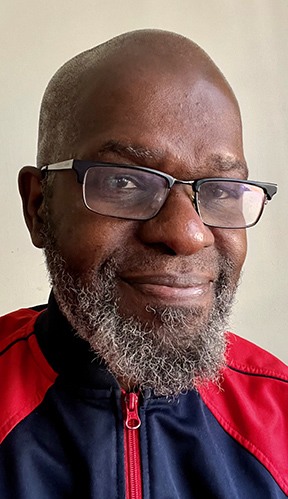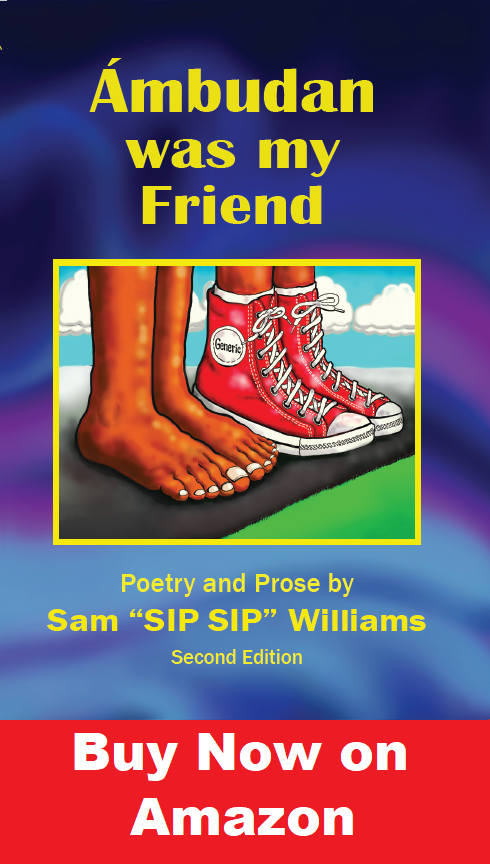


Sam Williams reflects on the Second Edition of Ámbudan
It was in the year 2008 that Sam "Sip Sip" Williams initially worte his first book of Poetry entitled "Ámbudan was my Friend," and he was extremely reflective in analysing where he was in terms of literary philosophy and where he is now.
Question 1: You speak about ecosystemic balance in several of your works, what do you mean by that?
Sam Williams: I've always believed that the environment feeds off of the totalityand balance of humanity, and it uses those good efforts that we make to get at a more efficient and beneficial end result for the betterment of mankind. Therefore, all human beings are born with some great talent and ability to bring about ecosystemic balance. In the end we are all connected spiritually, by God, by scientific forces, and by socio-environmental balance. Obviously, mankind has had a very rough time coming to grasp with any of these entities, especially the very concept of God. The worst thing that we as human beings can do is turn our backs on our origin, which we know very little about. We have created walls that almost permanently divide us, and we all tend to hold tightly to what we regard of as truth. But there is only one truth, not my or your trruth, but THE TRUTH, and if we put our ears to the ground so to speak, we will hear strange stories that our forefathers told which are beginning to make a little sense. We are now more technicological, but our forefathers we far more spiritual than we are now.
Question 2: In your book, you state that your parents were Evangelicals but sent you to a Catholic School; how challenging and problematic was that, especially as a young man?
Sam Williams: The whole situation careated a dynamic that resonates to this day. I wasn't the only one who went through this ordeal. It cast a shadow, and sometimes a was a good cool well needed shadow, over myself and family and friends around me. To go from a church atmosphere that had loud preaching, loud music and very, very open displays of people experiencing catching and moving in the Holy Spirit, and on the other hand, nuns and priest who were always somber, mundane, and measured every word that came out of their mouths; that was totally different. Actually, I liked and respected them both; it only became problematic when someone tried to push the "we're the only ones going to heaven" ideas, that irritated me; I wanted to look at the situations before me and make up my mind on my own.
Question 3: What was it that made you observe the highlights of the poem about Ambudan, especially the materialism at such a young and innocent age?
Sam Williams: It was about timing, destiny, and most of all a great lesson in materialism. Materialism. At such a young age, I didn't think directly of materialism. Yes, the Nuns and teachers in school and my parents at home always spoke about materialism in a thoughtful way in order to bring about awareness of it, but it was so distant, almost like something that they were teaching for me to be aware of in the far, far away future. I knew that we were poor, and had limited means, so I knew that I had to be responsible to not burden my parents; but at the same time, I felt that there were trivial things that they could afford, and unfortunately, I had that set of sixteen dollar Converse tennis shoes in the basket of things that I felt that they should have been able to afford, which clearly, they could not. It was a lesson in humility, selflessness, observation, and gratitude. The Nuns were humble, my parents were humble, and all of the teachers were humble, but some of my classmates were from wealth homes, and that was difficult for me, and I suppose, it would be hard for many a young person to navigate. These problems still exist; I have grandchildren.
Question 4: How is it that many people may go through the same or similar experiences, but but the writer sees and tells the story in an eye-opening way that almost everybody can relate to?
Sam Williams: I was always aware of my surroundings and very observing. I have always had a profound sense of both short-term and long-term periodic atmospheric timing, and appreciating the temporal lines of dilineation. They present nodes in life's timeline for guidance. To me it all boils down to faith. When I look back at my life, I can clearly see the Hand of God, especially when situations arise where He is clearly telling me to look, observe, and move in another direction.
Question 5: What is the most important thing that you want young people to get from this book?
Sam Williams: Most of all, I want them to get the sense of independence to observe, rationalize, and make sound decisions. Be aware of , but don't focus too much on where you are, and your circumstances of life. Because of my observations, the existence of God and my allowing His presence in my life is common sense. The nodes are obvious. Being a good person is wonderful, but being spiritually aware and functioning on a spiritual, calm and humane course, acknowledging and moving by God's Grace, is the single most important thing that any young person can do. That is the foundation of making good decisions, which we all need, but young people seem to need it now more than ever.

